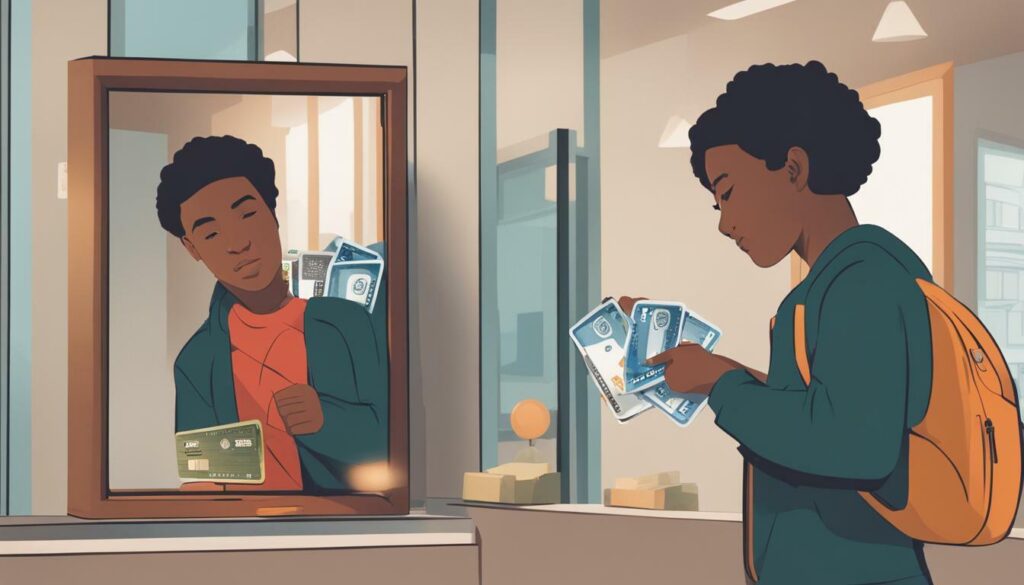Guidance for Navigating Credit Repair During Periods of Unemployment

Navigating credit repair during periods of unemployment can be challenging, but with the right guidance, you can take control of your financial health even without a regular income. It is important to pay attention to your credit and take steps to avoid unnecessary impacts. Cutting expenses, tightening your budget, and using savings cautiously are recommended. It is also important to consider filing for unemployment benefits if eligible. Making at least the minimum payment on bills is crucial to maintain a good payment history. Communicating with lenders about hardship options can help in managing debt payments. It is advised to avoid accumulating new credit card debt as it can negatively affect credit scores.
Regularly reviewing your credit reports for any changes and errors is essential. Unemployment itself does not directly impact credit scores, but the financial consequences can be significant. The damage to credit is not usually permanent, and taking steps to improve credit, such as paying bills on time and managing accounts responsibly, can help in the long run. It is important to be cautious of credit repair companies, as they cannot remove accurate negative information from credit reports. Disputing mistakes on your credit report can be done for free, and time and a plan to repay debts are key to improving credit. Scams related to credit repair should be reported to the appropriate authorities.
- Manage your credit during unemployment by cutting expenses, budgeting, and using savings judiciously.
- Make at least the minimum payment on bills to maintain a good payment history.
- Communicate with lenders about hardship options to manage debt payments.
- Regularly review your credit reports for changes and errors.
- Be cautious of credit repair companies and report scams to the appropriate authorities.
Tips for Repairing Credit During Unemployment
When faced with unemployment, there are several steps you can take to repair your credit and minimize negative impacts on your financial well-being. Cutting expenses, tightening your budget, and using savings cautiously are important strategies to implement during this time. By reducing unnecessary spending and prioritizing essential expenses, you can free up funds to stay current on your bills and avoid falling behind.

It is crucial to communicate with your lenders about your situation and explore hardship options that may be available to you. Many lenders offer assistance programs for individuals experiencing financial hardship, such as temporary payment reductions or deferments. By proactively reaching out to your creditors, you can demonstrate your commitment to managing your debt responsibly and potentially avoid negative credit reporting.
Additionally, it is important to be cautious when considering taking on new credit card debt. While it may be tempting to rely on credit during periods of unemployment, accumulating more debt can negatively impact your credit scores. Instead, focus on managing your existing debts and making at least the minimum payment on time to maintain a positive payment history.
🚨 TUIC Errors + Low Credit Score?
CreditScoreIQ helps you build credit faster by reporting utility bills to all 3 bureaus—while you dispute errors.
Start Building Credit Today →Creating a Budget
One effective way to manage your finances during unemployment is to create a budget. By carefully tracking your income and expenses, you can identify areas where you can cut back and allocate your funds more efficiently. Consider using budgeting tools or apps to help you stay organized and monitor your spending habits. Prioritize essential expenses such as housing, utilities, and food, and find creative ways to reduce discretionary spending.
As you navigate through this challenging period, it is important to remember that the damage to your credit is not usually permanent. By taking proactive steps, such as paying bills on time and managing your accounts responsibly, you can gradually rebuild your credit. Remember to regularly review your credit reports for any changes or errors, as addressing these inaccuracies can contribute to improving your credit over time.
| Tips for Repairing Credit During Unemployment |
|---|
| Cut expenses and tighten your budget |
| Communicate with lenders about hardship options |
| Avoid accumulating new credit card debt |
| Create a budget and prioritize essential expenses |
| Regularly review your credit reports for changes or errors |
Understanding the Impact of Unemployment on Credit Scores
It’s important to understand how unemployment can affect your credit scores and what strategies you can employ to rebuild your credit during this challenging time. While unemployment itself does not directly impact your credit scores, the financial consequences can be significant. The loss of income may result in missed bill payments and increased credit card debt, which can negatively impact your credit profile. However, there are steps you can take to minimize the impact and work towards improving your credit.
One of the first strategies to consider is cutting expenses and tightening your budget. During periods of unemployment, it’s crucial to prioritize essential expenses and limit discretionary spending. By reducing your expenses, you can free up more money to put towards paying off existing debt and maintaining a good payment history.
Additionally, it’s important to review your credit reports regularly for any changes and errors. Unemployment can sometimes lead to inaccuracies on your credit reports, such as missed payments that were actually made or accounts that were closed without your knowledge. By identifying and disputing these errors, you can ensure that your credit reports accurately reflect your financial situation.
While rebuilding your credit during unemployment can be challenging, it’s crucial to stay proactive. Making at least the minimum payment on bills is crucial to avoid further damage to your credit. Communicating with lenders about hardship options, such as deferment or forbearance, can also help you manage your debt payments. It’s important to be cautious of credit repair companies that claim to remove accurate negative information from your credit reports. Disputing mistakes on your credit report can be done for free, and over time, as you repay your debts and manage your accounts responsibly, your credit scores will gradually improve.

- Cut expenses and tighten your budget
- Make at least the minimum payment on bills
- Review your credit reports regularly for changes and errors
- Communicate with lenders about hardship options
- Dispute mistakes on your credit report for free
- Repay your debts and manage your accounts responsibly
By following these strategies and staying committed to improving your credit, you can overcome the challenges of unemployment and work towards rebuilding a healthy credit profile. Remember, the damage to your credit is not usually permanent, and with time and a plan to repay your debts, you can achieve financial stability once again.
Regularly Reviewing Credit Reports and Identifying Errors
Maintaining a close eye on your credit reports and promptly addressing any errors is essential when navigating credit repair during periods of unemployment. Unemployment itself does not directly impact your credit scores, but the financial consequences can be significant. To effectively repair your credit, it is crucial to regularly review your credit reports for any changes and errors that may arise.
Disputing mistakes on your credit report can be done for free, and it is a key step in improving your credit during periods of no income. By identifying and disputing errors, you can potentially remove inaccurate negative information that may be dragging down your credit scores. This can have a positive impact on your overall creditworthiness and increase your chances of qualifying for favorable loans or credit offers in the future.
It is important to be cautious of credit repair companies that promise to remove accurate negative information from your credit reports. These companies often charge exorbitant fees and cannot deliver on their promises. Instead, take the time to review your credit reports yourself and dispute any errors directly with the credit reporting agencies. This way, you can ensure that the information on your credit reports is accurate and up-to-date.
| Steps to Regularly Review Credit Reports |
|---|
| 1. Obtain your free annual credit reports from the three major credit bureaus (Equifax, Experian, and TransUnion) by visiting AnnualCreditReport.com. |
| 2. Carefully review each credit report for errors, such as incorrect personal information, fraudulent accounts, or inaccurate payment histories. |
| 3. If you identify any errors, gather supporting documents and evidence to back up your dispute. |
| 4. File a dispute with the credit reporting agencies online, by mail, or by phone. Provide a clear explanation of the error and include copies of any supporting documents. |
| 5. Follow up with the credit reporting agencies to ensure that your dispute is being investigated and resolved. |

By regularly reviewing your credit reports and addressing any errors, you are taking control of your credit repair journey. While it may take time and effort, the benefits of improving your creditworthiness are invaluable. Remember, time and a well-executed plan to repay debts are key factors in rebuilding and repairing your credit during periods of unemployment. Be proactive, stay informed, and stay committed to achieving financial stability.
The Long-Term Perspective on Credit Repair
While the challenges of credit repair during unemployment can be daunting, it’s important to maintain a long-term perspective and implement strategies that can lead to credit score improvement over time. One of the key steps in credit repair is to tighten your budget and cut unnecessary expenses. By carefully managing your finances during periods of unemployment, you can demonstrate responsible financial behavior to creditors and lenders.
It’s also crucial to review your credit reports regularly to identify any errors or inaccuracies. Incorrect information on your credit reports can negatively impact your credit scores. By disputing and correcting these errors, you can improve the accuracy of your credit reports and potentially increase your credit scores.
Additionally, it’s important to develop a plan to repay your debts. Creating a budget that includes debt repayment goals can help you prioritize your payments and work towards reducing your overall debt burden. Making consistent and timely payments on your bills and debts can have a positive impact on your credit scores over time. Communicating with lenders about hardship options, such as loan modifications or payment deferrals, can also help you manage your debt payments effectively during unemployment.
Scams related to credit repair should be reported to the appropriate authorities.

| Strategies for Credit Repair During Unemployment | Benefits |
|---|---|
| 1. Tighten your budget and cut unnecessary expenses | – Demonstrates responsible financial behavior – Helps reduce debt burden |
| 2. Regularly review credit reports for errors | – Improves accuracy of credit reports – Potential increase in credit scores |
| 3. Develop a debt repayment plan | – Prioritizes debt payments – Demonstrates commitment to financial responsibility |
| 4. Make consistent and timely payments on bills and debts | – Positive impact on credit scores over time |
| 5. Communicate with lenders about hardship options | – Helps manage debt payments effectively |
Implementing these strategies and maintaining a long-term perspective can help you navigate credit repair during periods of unemployment. Remember, credit repair takes time and patience, but with the right strategies and diligence, you can improve your credit scores and financial well-being.
Conclusion
Navigating credit repair during periods of unemployment requires proactive steps and careful management, but with the right approach, you can improve your credit and regain financial stability even without a regular income. During this challenging time, it is important to prioritize your credit and take steps to minimize unnecessary impacts.
To begin, consider cutting expenses, tightening your budget, and using savings cautiously. By making these adjustments, you can ensure that your financial resources are allocated wisely and that you are able to meet your essential needs.
In addition, it is crucial to continue making at least the minimum payment on your bills. By doing so, you can maintain a good payment history and avoid damaging your credit further. If you are experiencing difficulty in meeting your financial obligations, reach out to your lenders and explore hardship options that may be available to you.
Furthermore, it is advisable to avoid accumulating new credit card debt, as this can negatively impact your credit scores. Focus on managing your existing debts and building a solid payment history, which will help improve your credit in the long term.
Regularly reviewing your credit reports for any changes or errors is also essential. While unemployment itself does not directly affect your credit scores, the financial consequences can be significant. By identifying and disputing any mistakes on your credit reports, you can ensure that your credit information is accurate and fair, which is crucial for making informed financial decisions.
Remember, the damage to your credit is not usually permanent. By taking proactive steps, such as paying bills on time and managing your accounts responsibly, you can gradually improve your credit over time. Be cautious of credit repair companies, as they cannot remove accurate negative information from your credit reports. Instead, focus on developing a plan to repay your debts and rely on the passage of time to rebuild your credit.
If you encounter scams or fraudulent activities related to credit repair, it is important to report them to the appropriate authorities. By doing so, you can help protect yourself and others from falling victim to these unscrupulous practices.
By following these strategies and remaining diligent in managing your credit, you can navigate the challenges of credit repair during periods of unemployment and work towards regaining financial stability. Remember, taking control of your credit is within your reach, even without a regular income.
FAQ
Q: How can I manage my credit during periods of unemployment?
A: It is important to cut expenses, tighten your budget, and use savings cautiously. Make at least the minimum payment on bills and communicate with lenders about hardship options. Avoid accumulating new credit card debt and regularly review your credit reports for changes and errors.
Q: Does unemployment directly impact credit scores?
A: Unemployment itself does not directly impact credit scores. However, the financial consequences of unemployment can have a significant impact. Taking proactive steps to rebuild credit, such as paying bills on time and managing accounts responsibly, is crucial.
Q: How can I improve my credit while unemployed?
A: Improving credit while unemployed involves making minimum bill payments, managing debt responsibly, and exploring hardship options with lenders. Regularly reviewing credit reports and disputing errors for free can also help in the credit repair process.
Q: Is credit repair permanent during unemployment?
A: The damage to credit during unemployment is usually not permanent. By paying bills on time, managing accounts responsibly, and having a plan to repay debts, you can improve your credit in the long term. Time is a key factor in the credit repair process.
Q: Should I trust credit repair companies during unemployment?
A: It is advised to be cautious of credit repair companies, as they cannot remove accurate negative information from credit reports. Disputing mistakes on your credit report can be done for free. If you encounter credit repair scams, report them to the appropriate authorities.
Ready to Improve Your Credit?
Disputing TUIC errors is step one. Step two? Boost your score by reporting utility payments with CreditScoreIQ.
Get Started Now (Only $1 Trial) →3-bureau reporting • $1M identity insurance • Dark web monitoring

